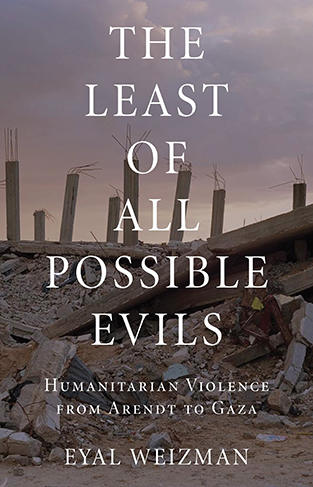- Home
- Books
- Sale
- Online Book Bazar Up To 60%
- The Least of All Possible Evils: A Short History of Humanitarian Violence
The Least of All Possible Evils: A Short History of Humanitarian Violence
By: Eyal Weizman
-
Rs 4,295.00
Due to constant currency fluctuation, prices are subject to change with or without notice.
The Least of All Possible Evils: A Short History of Humanitarian Violence
By: Eyal Weizman
Rs 4,295.00 Ex Tax :Rs 4,295.00
Zubin Mehta: A Musical Journey (An Authorized Biography)
By: VOID - Bakhtiar K. Dadabhoy
Rs 840.00 Rs 1,050.00 Ex Tax :Rs 840.00
The Origins of Political Order From Prehuman Times to the French RevolutioN
By: Francis Fukuyama
Rs 4,495.00 Ex Tax :Rs 4,495.00
Manning Up: How the Rise of Women Has Turned Men into Boys
By: Kay Hymowitz
Rs 995.00 Ex Tax :Rs 995.00
The Obama Syndrome: Surrender At Home War Abroad
By: Tariq Ali
Rs 1,036.00 Rs 1,295.00 Ex Tax :Rs 1,036.00
The Quest For Meaning: Developing A Philosophy Of Pluralism
By: Tariq Ramadan
Rs 1,116.00 Rs 1,395.00 Ex Tax :Rs 1,116.00
The Pakistan US Conundrum Jihadists The Military And The People The Struggle For Control
By: Yunas Samad
Rs 1,116.00 Rs 1,395.00 Ex Tax :Rs 1,116.00
An Enemy We Created: The Myth Of The Taliban Al Qaeda Merger In Afghanistan 19702010
By: Alex Strick van Linschoten
Rs 5,250.00 Ex Tax :Rs 5,250.00
WikiLeaks: Inside Julian Assanges War on Secrecy
By: David Leigh & Luke Harding
Rs 850.00 Ex Tax :Rs 850.00
No similar books from this author available at the moment.
No recently viewed books available at the moment.
Zubin Mehta: A Musical Journey (An Authorized Biography)
By: VOID - Bakhtiar K. Dadabhoy
Rs 840.00 Rs 1,050.00 Ex Tax :Rs 840.00
The Least of All Possible Evils: A Short History of Humanitarian Violence
By: Eyal Weizman
Rs 4,295.00 Ex Tax :Rs 4,295.00














-120x187.jpg?q6)





-120x187.jpg?q6)



-120x187.jpg?q6)



